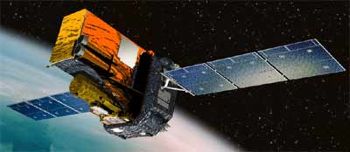
Home - Search - Browse - Alphabetic Index: 0- 1- 2- 3- 4- 5- 6- 7- 8- 9
A- B- C- D- E- F- G- H- I- J- K- L- M- N- O- P- Q- R- S- T- U- V- W- X- Y- Z
Integral
 Integral Credit: Manufacturer Image |
Status: Operational 2002. First Launch: 2002-10-17. Last Launch: 2002-10-17. Number: 1 . Gross mass: 4,100 kg (9,000 lb).
7 m diameter) satellite was equipped with two tons of instruments to monitor gamma rays, x-rays, and visible light--the gamma ray emitters being of primary interest.
The satellite was equipped with the following instruments:
- SPI (SPectrometer on Integral) was a gamma ray spectrometer with a "coded mask" front-plate consisting of 64 transparent and 63 opaque small hexagons arranged in a complex pattern. The shadow provided by the plate was unique to each direction of arrival. Behind this plate at 1.7 m was an array of 19 cryogenic (85 deg K) germanium detectors of total area 500 cm2, to measure the energy of the incoming photons in the range 20 keV-8 MeV at an accuracy of 0.2% of their energies. The instrument allowed a celestial gamma source to be located at an accuracy of 2 deg within the field of view of 16 deg . Most of the mass of the 1.3-ton instrument was intended to shield the detectors from stray radiation. J.-P. Roques of CSER, Toulouse, France and V. Schoenfelder of MPE, Garching, Germany were the Principal Investigators.
- IBIS was a gamma ray imaging telescope providing images in the composite energy range of 15 keV-10 MeV. It consisted of a coded mask front-plate backed up by two layers of pixels. The first layer had 16,384 Cd-Te pixels; immediately behind this was a thicker layer of 4,096 Cs-I pixels to monitor the more energetic photons. It rejected stray contamination by heavy shielding on the sides and bottom. The image resolution was 30 arc-seconds. (Principal Investigators: P. Ubertini, IAS, Rome, Italy; F. Lebrun, CE-Saclay, France; and G. DiCocco, ITESRE, Bologna, Italy.)
-
JEM-X (Joint European Monitor, X-rays) provided images in the 3-35 keV energy range, at a resolution of three arc-min. This too had a coded mask front-plate backed with a 3.2 m by a detection plane. The detector was a pair of xenon-methane gas chambers, backed up by a 1,000-cm2 grid of position sensing wires which collect the accelerated and cascading photoelectrons. (Principal Investigator: Niels Lund, DSRI, Copenhagen, Denmark.)
- OMC (Optical Monitoring Camera) was intended to image the gamma ray sources in visible light from sources with a magnitude as weak as 19.7. It was a refractor telescope with a 5-cm lens, imaging onto an array of CCDs kept at -80 deg C. The field of view was 5 deg x 5 deg and the resolution was 18 arc-seconds. (Principal Investigator: M. Mas-Hesse, LAEFF-INTA, Madrid, Spain)
NASA NSSDC Master Catalog Description
The International Gamma-Ray Astrophysics Laboratory (INTEGRAL) is a European Space Agency (ESA) mission designed to study celestial gamma-ray sources in the 15 keV to 10 MeV energy range. The primary INTEGRAL science payload consists of a gamma ray spectrometer (SPI) operating over 20 keV-8 MeV, a gamma ray imager (IBIS) operating over 15 keV-10 MeV, an X-ray monitor (JEM-X) operating in the 3-35 keV band, and an Optical Monitoring Camera (OMC) operating at 550 nm.
The spacecraft was launched on October 17, 2002 into a 66 hr., 639 x 153,000 km orbit at 51.7 degrees inclination. The mission is scheduled to last 2 years, and up to 5 years is possible. The spacecraft is three-axis stabilized with an absolute pointing error of 5 (y,z) to 15 (x) arcmin and an absolute measurement error of 1 (y,z) to 3 (x) arcmin. The spacecraft with solar panels stowed is roughly 3 x 4 x 5 m in size with a mass of about 4000 kg, 520 kg of that being hydrazine fuel. Science telemetry will be transmitted in S-band at 86 kbit/s to ground stations in Redu (Belgium) and Goldstone (US).
More at: Integral.
Family: Astronomy, Gamma ray astronomy satellite. Country: Europe. Launch Vehicles: Proton, Proton-K/17S40. Launch Sites: Baikonur, Baikonur LC200/39. Bibliography: 2, 3813, 552, 554, 6591, 12660.
2002 October 17 - . 04:41 GMT - . Launch Site: Baikonur. Launch Complex: Baikonur LC200/39. LV Family: Proton. Launch Vehicle: Proton-K/17S40.
- Integral - . Mass: 4,100 kg (9,000 lb). Nation: Europe. Class: Astronomy. Type: Gamma ray astronomy satellite. Spacecraft: Integral. USAF Sat Cat: 27540 . COSPAR: 2002-048A. Apogee: 153,435 km (95,339 mi). Perigee: 9,283 km (5,768 mi). Inclination: 53.40 deg. Period: 4,310.60 min. INTEGRAL (INTErnational Gamma Ray Astrophysics Laboratory) was a European (ESA) astrophysics satellite. The orbit had a very high apogee to escape magnetospheric radiation..
Back to top of page
Home - Search - Browse - Alphabetic Index: 0- 1- 2- 3- 4- 5- 6- 7- 8- 9
A- B- C- D- E- F- G- H- I- J- K- L- M- N- O- P- Q- R- S- T- U- V- W- X- Y- Z
© 1997-2019 Mark Wade - Contact
© / Conditions for Use